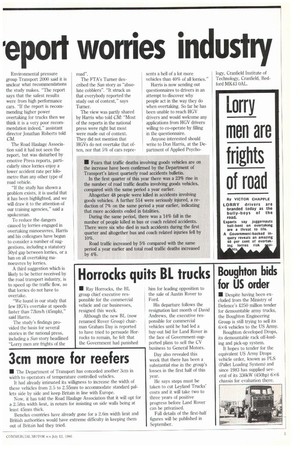eport worries industry
Page 7

If you've noticed an error in this article please click here to report it so we can fix it.
Environmental pressure group Transport 2000 said it is unclear what recommendations the study makes. "The report says that the safest results were from high performance cars. "If the report is recommending higher power overtaking for trucks then we think it is a very poor recommendation indeed," assistant director Jonathan Roberts told CM.
The Road Haulage Association said it had not seen the report, but was disturbed by emotive Press reports, particularly since lorries enjoy a lower accident rate per kilometre than any other type of road vehicle.
"If the study has shown a problem exists, it is useful that it has been highlighted, and we will draw it to the attention of our training agencies," said a spokesman.
To reduce the dangers caused by lorries engaged in overtaking manoeuvres, Harris and his colleagues have begun to consider a number of suggestions, including a statutory 50yd gap between lorries, or a ban on all overtaking manoeuvres by lorries.
A third suggestion which is likely to be better received by the road transport industry, is to speed up the traffic flow, so that lorries do not have to overtake.
"We found in our study that few HGVs overtake at speeds faster than 72km/h (45mph)," said Harris.
The study's findings provided the basis for several stories in the national press, including a Sun story headlined "Lorry men are frights of the
road".
The FTA's Turner described the Sun story as "absolute cobblers". "It struck us that everybody reported the study out of context," says Turner.
The view was partly shared by Harris who told CM: "Most of the reports in the national press were right but most were made out of context. They did not mention that HGVs do not overtake that often, nor that 5% of cars repre
sents a hell of a lot more vehicles than 40% of all lorries."
Harris is now sending out questionnaires to drivers in an attempt to discover why people act in the way they do when overtaking. So far he has been unable to reach HGV drivers and would welcome any applications from HGV drivers willing to co-operate by filling in the questionnaire.
Anyone interested should write to Don Harris, at the Department of Applied Psycho logy, Cranfield Institute of Technology, Cranfield, Bedford MK43 OAL.




















































































